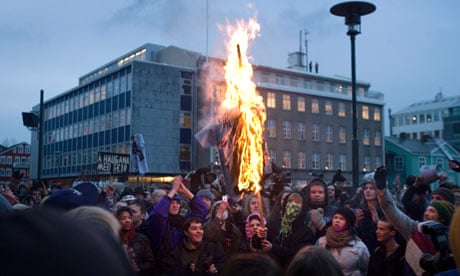The global economic crisis claimed its first leader yesteday, as Iceland's prime minister announced the immediate resignation of his government following the collapse of the country's currency and banking system.
Geir Haarde said as recently as Friday that his coalition would remain in office until early elections, called for 9 May, after violent protests at its handling of Iceland's tottering economy.
Yesterday he threw in the towel, saying that his Independence party and its Social Democratic Alliance partners were quitting immediately as he could not accept a demand by the Alliance to take over the premiership.
"What I have feared the most has come to pass, we now have a governmental crisis on top of the economic one," Haarde said.
The prime minister told reporters that a continuing of the coalition would have been the best result. "We couldn't accept the Social Democratic demand that they would lead the government. That is not something we agreed on in 2007."
The government started with a famous kiss between Haarde and Ingibjorg Solrun Gisladottir, the head of the Alliance party, in the spring of 2007.
The government held a two-thirds parliamentary majority and would have remained in power until the spring of 2011 had it not been for the country's economic meltdown.
Gisladottir said yesterday: "We would become like a divorcing couple, shouting at each other, if we continued like this. That's not my style."
Iceland's president, Olafur Ragnar Grimsson, said he was unlikely to give any party a mandate to form a new government until today.
"It's very natural that the president will first sound out if there is a majority to be found in parliament," he said. "I have asked everyone in the current (administration) to continue to do their jobs until a new government has been formed."
Haarde has been in office since mid-2006. The 57-year-old has the dubious distinction of being the first world leader to leave office as a direct result of the world financial crisis. Last week, Haarde revealed he had been diagnosed with throat cancer and would not be seeking reelection anyway.
The prime minister's previous national popularity was obliterated in October when the global credit crisis ravaged Iceland's hugely indebted economy, leading to a collapse in the country's currency, the crown, and forcing the government to take control of its three major banks.
The population of 320,000 - who had enjoyed years of rising incomes and high growth rates, thanks in no small part to an economy burdened with a foreign debt that peaked at 10 times the annual national GDP - now face a potential economic contraction of up to 10% this year, with unemployment rising rapidly.
After months of rallies outside the parliament building, last week protesters pelted Haarde's car with eggs while riot police used teargas for the first time since 1949.
The protests continued at the weekend despite Haarde's announcement of the early election.
Yesterday the country's commerce minister, Bjorgvin Gudni Sigurdsson, resigned, apologising for the collapse.
"I accept my part of responsibility in the collapse of the banking sector even if numerous other people have their share of responsibility," Sigurdsson, a Social Democrat, told a press conference.
Who will take over from Haarde is unclear. Gisladottir, currently Iceland's foreign minister, immediately ruled herself out.
Gisladottir has only just returned to Reykjavik after undergoing treatment for a brain tumour in Sweden.
Gisladottir has called for another senior member of her party, Johanna Sigurdardottir, the social affairs minister, to lead a new government.
"A new government should be formed by the end of the week," Baldur Thorhallsson, a political science professor from the University of Iceland, said.
"It seems most likely that we will have a minority government of the Alliance party and the left-greens."
Steingrimur Sigfusson, leader of the left-greens, offered a national government in October, when the collapse became apparent, which the government rejected. Sigfusson said that he is now considering all possibilities.
Protesters celebrated the fall of the coalition government with a party outside the parliament building.
"I am proud of the Icelandic people to have driven this off their hands. Now that the suspect is leaving the scene of the crime, the investigation can begin," Illugi Jokulsson, a publisher, said.
"The Independence Party should not run anything except the transportation ministry at most," Erpur Eyvindarson, a rapper, said.
Eyvindarson continued: "They ignored us in 1949, they ignored us when they went to war in Iraq and when they dammed the highlands. They will ignore us no more."
